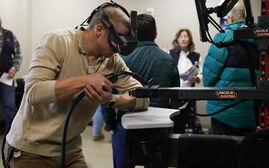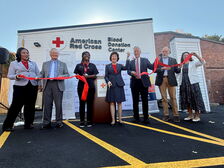Maine tourism industry will be pressed to find enough seasonal workers
 Photo / Laurie Schreiber
Tourists flocking to Bar Harbor each year support a robust seasonal economy. But local businesses struggle to find enough workers.
Photo / Laurie Schreiber
Tourists flocking to Bar Harbor each year support a robust seasonal economy. But local businesses struggle to find enough workers.
The Department of Homeland Security this week announced that an additional 35,000 H-2B visas will be made available to employers across the country to fill seasonal jobs.
It’s an increase of 5,000 compared to the additional visas allotted in 2019.
But the visas will only be available to returning workers awarded a seasonal visa in at least one of the last three fiscal years, according to a news release.
And some say the bump up still won’t meet actual need.
In December, U.S. Sens. Susan Collins, R-Maine, and Angus King, I-Maine, wrote Acting DHS Secretary Chad Wolf in a letter signed by 14 senators. The letter urged him to release the visas to allow Maine small businesses to hire additional temporary employees and help support their operations during the busy summer tourist season.
In January, King and U.S. Rep. Chellie Pingree, D-Maine 1st District, led a letter that that was signed by 189 members of Congress, including Collins and U.S. Rep. Jared Golden, D-Maine 2nd District, urging Wolf to immediately increase the statutory cap of H-2B visas.
King and Pingree note in the letter that many business sectors — including tourism and hospitality, seafood processing, golf courses, fairs and carnivals — continue to struggle with seasonal labor shortages that are aggravated by the administration's cap on the visas.
“Nearly 37 million people visit Maine each year, supporting the jobs of more than 100,000 Mainers,” King and Collins said in a joint news release. “In order to host this large number of visitors, most of whom arrive during the busy summer season, Maine businesses need H-2B workers to supplement their Maine workforce.
"Without their help, many hotels and restaurants would be unable to open or would have to curtail their operations, hurting local communities and Maine workers employed by these businesses.”
The additional visas will help provide relief to many Maine small businesses, but “there is still an overwhelming need given the current tight labor market and record low unemployment,” they continued. “We will continue our efforts to reform the H-2B program to ensure Maine small businesses do not continue to suffer from a lack of workers.”
Finding adequate staff is the Maine hospitality industry’s biggest annual issue, Greg Dugal, director of government affairs for HospitalityMaine, said in the release. He added, “35,000 additional visas would be the most we have received in the last four years, and we are extremely grateful.”
In 2017 and 2018, DHS provided an additional 15,000 H-2B visas and 30,000 additional H-2B visas in 2019.
When the U.S. Department of Labor opened the H-2B visa application window last January, it immediately received applications for over 96,400 H-2B worker positions, reflecting a severe shortage of seasonal workers.
Pingree said she welcomed the 35,000 additional visas but expressed frustration that the number is still is not enough to meet the needs of Maine’s seasonal businesses and that it contains new measures that could limit Maine employers’ access to needed workers. Pingree said as a member of the House Appropriations Committee she will keep fighting to increase the available H-2B guest worker visas.
“Members of Congress on both sides of the aisle have given the Trump administration authority to issue up to nearly 130,000 H-2B visas, but for the fourth year in a row the administration has come up short,” Pingree said in a news release. “Maine’s peak tourism season is around the corner and I know the urgency that seasonal businesses across Maine feel to address their workforce shortages.”
H-2B visas are non-immigrant visas that allow employers to temporarily hire foreign employees for one-time occurrences and seasonal, peak-load or intermittent needs.













0 Comments